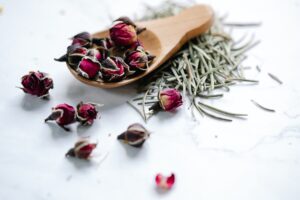The Secret to Natural Radiance

Herbal infusions have been used for centuries for medicinal purposes and their benefits are now being recognized in the beauty industry as well. Natural remedies for different skin types can be created using herbal infusions, which are essentially teas made from various herbs and botanicals. These infusions can be used for a variety of purposes, including cleansing, toning, and moisturizing the skin. In this blog, we’ll explore the power of herbal infusions for body care and share some natural remedies for different skin types.
1. The Benefits of Herbal Infusions
Herbal infusions are a great way to nourish your skin with natural, plant-based ingredients. They contain antioxidants, vitamins, and minerals that help to rejuvenate and protect the skin. Herbal infusions are also a gentle and natural way to treat various skin conditions, such as acne, eczema, and psoriasis. They can help to soothe inflammation, reduce redness, and promote healing.
Herbal infusions are also very versatile and can be used in a variety of body care products, including toners, moisturizers, and facial masks. They are also easy to make at home and can be customized to suit your skin type and specific concerns.
2. Natural Remedies for Different Skin Types
Herbal infusions can be used to create natural remedies for different skin types. Here are some recipes to get you started:
For Dry Skin
Try a chamomile and lavender infusion. Chamomile is a gentle herb that helps to soothe and calm the skin, while lavender has antibacterial properties that help to cleanse and heal. Steep a handful of chamomile flowers and a handful of lavender buds in hot water for 10-15 minutes. Strain the infusion and use it as a toner or mix it with your favorite moisturizer.
For Oily Skin
Try a green tea and mint infusion. Green tea is rich in antioxidants that help to protect the skin from environmental damage, while mint has astringent properties that help to control oil production. Steep a handful of green tea leaves and a handful of fresh mint leaves in hot water for 10-15 minutes. Strain the infusion and use it as a toner or mix it with your favorite moisturizer.
For Sensitive Skin
Try a calendula and rose infusion. Calendula is a gentle herb that helps to soothe and calm the skin, while rose has anti-inflammatory properties that help to reduce redness and irritation. Steep a handful of calendula flowers and a handful of rose petals in hot water for 10-15 minutes. Strain the infusion and use it as a toner or mix it with your favorite moisturizer.
For Aging Skin
Try a hibiscus and rosehip infusion. Hibiscus is rich in antioxidants that help to protect the skin from free radical damage, while rosehip is high in vitamin C, which helps to promote collagen production and reduce the appearance of fine lines and wrinkles. Steep a handful of hibiscus flowers and a handful of rosehip seeds in hot water for 10-15 minutes. Strain the infusion and use it as a toner or mix it with your favorite moisturizer.
3. Tips for Making Herbal Infusions
Here are some tips for making herbal infusions:
- Use high-quality herbs and botanicals. Choose organic, non-GMO herbs and botanicals for the best results.
- Use filtered or distilled water. Tap water can contain impurities that can affect the quality of the infusion.
- Steep the herbs for the recommended time. Different herbs require different steeping times, so be sure to follow the recommended time for each herb.
- Strain the infusion well. Use a fine-mesh strainer or cheesecloth to strain out any small pieces of herbs or debris, as they can irritate the skin.
- Store the infusion properly. Store any leftover infusion in a sealed container in the refrigerator for up to a week. Discard any infusion that has an off odor or appears cloudy.
- Experiment with different herbs and botanicals. There are many different herbs and botanicals that can be used to create herbal infusions, so feel free to experiment and find the ones that work best for your skin type and concerns.
In Conclusion
Incorporating herbal infusions into your body care routine can be a wonderful way to nourish and care for your skin naturally. Whether you have dry skin, sensitive, aging or oily skin, there is an herbal infusion recipe that can help to address your specific needs. By using high-quality herbs and following the tips above, you can create effective and natural remedies for different skin types that will leave your skin looking and feeling its best.

